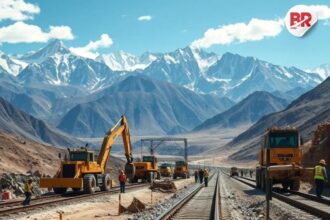
Prime Minister Narendra Modi is set to inaugurate the Udhampur-Srinagar-Baramulla Railway Link (USBRL) in Jammu and Kashmir on June 6, 2025.
As part of the event, he will also launch two new Vande Bharat Express trains and open two major railway bridges — the Chenab Bridge, which is the world’s highest railway arch bridge, and the Anji Khad Bridge, India’s first cable-stayed railway bridge. With this launch, Kashmir will finally have all-weather railway connectivity with the rest of the country, marking a historic milestone for Indian Railways.


Regular operations of the two Vande Bharat Express trains will begin from June 7, 2025. To start with, these trains will run between Shri Mata Vaishno Devi Katra and Srinagar, since Jammu Tawi station is currently under redevelopment. Once the station work is completed under the Amrit Bharat scheme, the train services will be extended from Srinagar to Jammu. These high-speed trains will run six days a week, offering faster, safer, and more comfortable travel in the region.
The first Vande Bharat pair, train number 26401/26402, will run except on Tuesdays. Train 26401 will depart from Katra at 8:10 AM and reach Srinagar by 11:08 AM, with a stop at Banihal at 9:58 AM. On the return journey, train 26402 will leave Srinagar at 2:00 PM, stop at Banihal at 3:10 PM, and reach Katra by 4:48 PM. The second pair, train number 26403/26404, will run every day except Wednesday. Train 26404 will leave Srinagar at 8:00 AM, halt at Banihal at 9:02 AM, and arrive in Katra at 10:58 AM. The return train, 26403, will start from Katra at 2:55 PM, stop at Banihal at 4:40 PM, and reach Srinagar by 5:53 PM.
The USBRL project is one of India’s most ambitious railway undertakings, covering 272 kilometers through some of the toughest Himalayan terrain. Built at a cost of ₹43,780 crore, the rail link features 36 tunnels spanning 119 kilometers and 943 bridges connecting deep valleys and high mountain ridges. This engineering marvel is expected to significantly boost transportation, commerce, and tourism in Jammu and Kashmir by linking remote areas to the national rail network.
To ensure smooth and safe travel in extreme winter conditions, the Vande Bharat trains on this route have been specially designed to withstand temperatures as low as -20°C. They feature heated windshields, advanced heating systems, and thermally insulated toilets to ensure passenger comfort throughout the year. This landmark project not only improves infrastructure but also strengthens the connection between Kashmir and the rest of India, promising a new era of progress and integration for the region.












